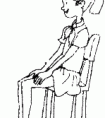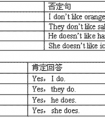根据图示填单词。 1. 2. 3. 4.1. YesterdayJohn .2.LastweekendJohnthe .3. —Whatdidyoudoyesterday ? —Iyesterday.4.LiuYun: Whatdidyoudolastweekend ? Chen-六年级英语
3)动名词的否定直接在其前加否定词,通过代词的宾格或所有格形式给出逻辑主语
例:
I would appreciate_______ back this afternoon.
A.you to call
B.you call
C.you calling
D.you’re calling
(Key:C;换成your calling也对)
4)有些词后只能接动名词
acknowledge;admit; advise;advocate;allow;appreciate; avoid; celebrate; consider; contemplate; defer; delay; deny; detest; discontinue; dislike; dispute; enjoy; it entails; escape; excuse; explain; fancy; feel like; finish; forgive; can’t help; hinder; imagine; it involves; keep; it means; mention; mind; miss; it necessitates; pardon; postpone; practice; prevent; recall; report; resent; resist; risk; suggest; understand...
5)另外还有一些接-ing形式的常用说法
it’s no good; it’s no/little/hardly any/ use; it’s not/hardly/scarcely use; it’s worthwhile; spend money/time; there’s no; there’s no point in; there’s nothing worse than; what’s the use/point...
6)有些词后面加不定式和动名词均可
remember,forget,try,stop,go on,continue,stop,regret,cease,mean后面均可用不定式和-ing形式,但意义截然不容。
例:
remember to do/doing:
①I remembered to post the letters.(指未来/过去未来将要做的动作)
②I remembered posting/having posted the letters.(我记得做过这个动作)
forget与remember的用法类似。
regret的用法:
①I regret to inform you that…(我很遗憾地通知你……)
②I regretted having left the firm after twenty years.(为了“二十年前的离开”而遗憾。)
try to(努力)与try +–ing(试验):
①You really must try to overcome your shyness.
②Try practicing five hours a day.
动名词用法口诀:
动名词常泛指,句法作用宾/表/定与主,时态/语态之形式,一般/完成/被动式。
Being done 系被动,不含任何进行意。
用作主语请留意,常用it作形式主语,不指未来发生事,表达的信息系已知。
用作表语请记清,作用相当一名词,检验方法很简单,主与表换位能成立。
用作定语也易辩,表示名词之用途。
用作宾语稍复杂,关键留意谓语动词(跟动名词作宾语的常用动词附后),时态同谓动作比较,先于谓动用完成式,其逻辑主语不固定,在句中/句外均有之。
否定式其前加not,复合式其前加物主词,非句首宾格词也可用,尤其口语中更如此。
说明:
1、主-----主语
2、宾-----宾语
3、表------表语
4、定------定语
5、谓动---谓语动词
- 最新内容
- 相关内容
- 网友推荐
- 图文推荐
上一篇:Whatdidyoudolastweekend ?[ ]A. Ivisitmygrandparents.B.Iplayfootball.C.Iwashedclothes.-六年级英语
下一篇:We__________totheparkyesterday.[ ]A.wentB.goC.will go-六年级英语
零零教育社区:论坛热帖子
| [家长教育] 孩子为什么会和父母感情疏离? (2019-07-14) |
| [教师分享] 给远方姐姐的一封信 (2018-11-07) |
| [教师分享] 伸缩门 (2018-11-07) |
| [教师分享] 回家乡 (2018-11-07) |
| [教师分享] 是风味也是人间 (2018-11-07) |
| [教师分享] 一句格言的启示 (2018-11-07) |
| [教师分享] 无规矩不成方圆 (2018-11-07) |
| [教师分享] 第十届全国教育名家论坛有感(二) (2018-11-07) |
| [教师分享] 贪玩的小狗 (2018-11-07) |
| [教师分享] 未命名文章 (2018-11-07) |

![Yesterdayhe hiskeys,sohecan'tgohome.[ ]A. losedB. lostC. losesD. losted-六年级英语](http://www.00-edu.com/d/file/ks/4/1/51/2019-08-24/small56b740c860ea72171119a747c83813f51566588119.gif)

![I ____________ to the store on Sunday. [ ]A. goB. went-五年级英语](http://www.00-edu.com/d/file/ks/4/1/51/2019-08-24/smallb5041caaeb2961272b3d1491492e45251566588603.gif)


